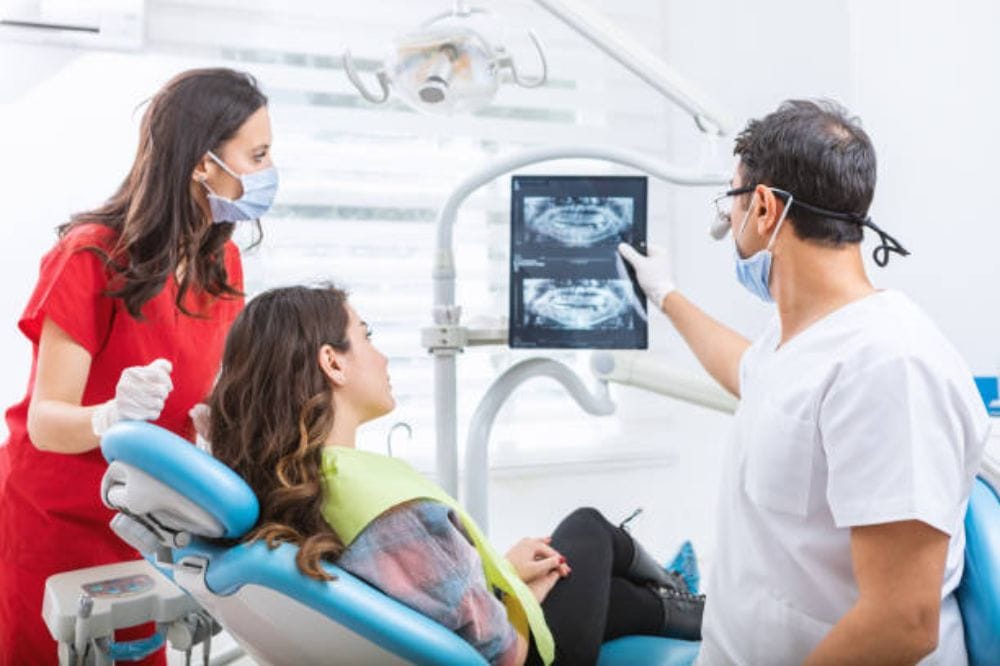 Dental X-rays are among the most essential equipment utilized to identify impacted teeth, the most prevalent being wisdom teeth. Impacted teeth never surface through the gums but may be painful, infected, or harm adjacent teeth.
Dental X-rays are among the most essential equipment utilized to identify impacted teeth, the most prevalent being wisdom teeth. Impacted teeth never surface through the gums but may be painful, infected, or harm adjacent teeth.
If you are looking for dental X-rays in NW Calgary, this article discusses how X-rays assist dentists in identifying and treating impacted teeth before they cause significant issues.
Why Should You Visit a Dentist for Suspected Impacted Teeth?
Consulting a dentist in NW Calgary is the first step if you’re experiencing jaw pain, swollen gums, or teeth that aren’t coming in as expected.
Dentists use dental exams and X-rays together to:
- Spot teeth trapped in the gum or bone
- Monitor how close they are to nerves or other teeth
- Decide if removal or other treatment is needed
You don’t have to wait for severe pain to get help; early detection prevents bigger issues.
How Can a Dentist Help with Early Detection?
A dentist near you might be able to respond promptly by performing a quick X-ray on a regular visit. X-rays allow your dentist to:
- Evaluating teeth roots and jawbone
- Inspect whether a tooth is emerging at the wrong angle
- Identify concealed infections or cysts
Early detection spares you the agony of shock and permits less difficult treatment methods.
How X-Rays Detect Impacted Teeth Clearly
Want to find out how X-rays identify affected teeth? Here’s what dentists check:
- Tooth alignment: Is the tooth wedged or tipped horizontally?
- Stage of growth: Is the tooth half or completely buried in the gum?
- Space: Is there sufficient space for the tooth to erupt?
This detailed view helps dentists create a course of treatment suitable to your needs, be it surgery, observation, or simply doing nothing.
What Makes X-Ray Imaging Useful for Impacted Wisdom Teeth?
X-ray imaging for impacted wisdom teeth is especially important during the teen and young adult years. These are the last teeth to grow in and often get stuck due to a lack of space.
Here’s what X-rays help show:
- Position near nerves or sinuses
- Bone structure around the tooth
- Signs of damage to nearby teeth
This helps your dentist avoid nerve injury or future complications if extraction is needed.
What Are the Different Types of Dental X-Rays Used?
Not all dental X-rays are the same. Dentists use different types based on what they’re trying to see. For diagnosing impacted teeth, some of the most helpful include:
- Panoramic X-rays – Show your entire jaw, all your teeth, and their positions in one image.
- Periapical X-rays – Focus on one or two teeth, including the root and surrounding bone.
- Cone Beam CT (CBCT) – A 3D scan that provides a full view of the tooth’s position relative to nerves and sinuses.
Each type helps the dentist understand the full picture before deciding on treatment or surgery.
X-Rays Make the Invisible Visible
Impacted teeth don’t always show signs right away. Dental X-rays let your dentist catch problems early, so treatment is easier and less painful.
Sage Hill Dental offers complete X-ray diagnostics in a comfortable, professional setting. Whether you’re worried about wisdom teeth or just due for a checkup, our team is here to help.
Book your appointment with us today for a stress-free X-ray exam. Let us help protect your smile before small problems turn big.
Frequently Asked Questions
Q1. Are dental X-rays safe?
Yes. The radiation levels are very low, and protective shields are used to keep you safe.
Q2. How often should I get dental X-rays?
Most people need X-rays once a year, but it depends on your dental health.
Q3. Can impacted teeth fix themselves?
Usually, no. Most impacted teeth need to be monitored or removed by a dentist.
Q4. What happens if I ignore an impacted tooth?
It may lead to pain, infection, damage to other teeth, or even bone loss.
Q5. Do all wisdom teeth need to be removed?
Not always. If they’re healthy, positioned well, and not causing problems, they might not need removal.

